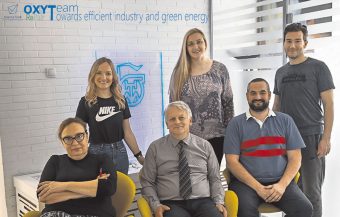
An innovative technological procedure for the complete processing and repair of waste titanium electrodes from hydrometallurgy is the subject of research in the OxyRePair project, which, in the period from 2023 to 2025, is financed by the Science Fund of the Republic of Serbia. The project was financed as part of the Green Program of Cooperation between Science and Industry, and the project holder is the National Institute of Chemistry, Technology, and Metallurgy of the University of Belgrade, which carries out research in cooperation with four other scientific and higher education institutions from Serbia.
The research results will offer domestic and regional industrial environment technology for restoring waste electrode resources, with a secondary reaction of water oxidation and electricity consumption. At this moment, the processing and restoration of the electrodes require considerable costs. The electrode manufacturing process will be operationally optimized for the first time to predict the manufacturing parameters of any electrode shape required by specific processes.
The research will establish two key production steps: the mechanical repair of titanium and the formulation of activation for efficient water oxidation.
The setup will be closely related to the main goal of operational research: predicting the conditions of each step to reach an acceptable lifespan of the recovered electrode resource for an economically acceptable production process.
Project results refer mostly to specific industrial entities that deal with the electrochemical production of metals. Companies that produce precious metal powders and metal food packaging do not practice remanufacturing process electrodes as a step for a sustainable closed economic circle but choose between buying new and repairing deactivated anodes, depending on cost-effectiveness. Deactivated electrodes accumulate as process waste and take up production space. The project results will enable companies to close the loop on the use of electrodes with optimized on-site technology. In addition, the project activities will propose specific procedures for a given production environment to extend the lifespan of the electrode and thus reduce the frequency of intermittent interruptions of the production process.
IN FOCUS:
- Innovative Series of ABB Frequency Converters for Environmentally Sustainable Solar Water Pumping Systems
- Manasija Gets a Solar Power Plant
- Innovative Application of Information Technologies in Agriculture
Specific on-site technology will thus significantly reduce production costs and improve industrial waste management. According to the proposed technology, the deactivated electrode resource, which is disposed of as process waste, will be recovered by the users themselves, which is currently not possible and constitutes a significant environmental aspect of the project. This will significantly reduce companies’ costs related to the disposal and care of waste resources and the acquisition of new electrode equipment.
At the domestic and regional economic levels, the project will offer a significant technological procedure for many important and modern industrial branches but does not exist as a technological solution. The procedural solution also contains an aspect of innovation concerning equivalent traditional offers in countries such as Italy, Germany, China, and India. At the global level, the contribution of the project results in improving energy efficiency within the concept of engaging renewable energy sources is also expected.
The main value of the project’s innovative technology is its wide application: it can be used for the processes of cathodic protection of steel structures against corrosion, treatment of industrial wastewater, and water electrolysis for the storage of green hydrogen fuel from renewable energy sources.
Project Team OxyRePair
Read the whole story in the new issue the Energy portal Magazine AGROSOLAR ENERGY AND RES.

